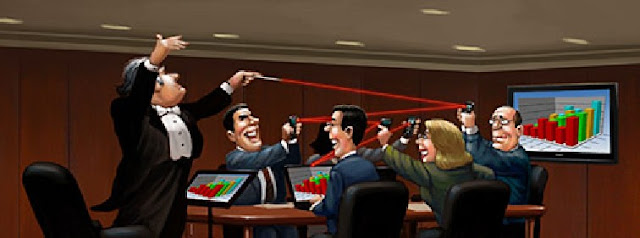Via: BNET Blog - Play a Game, Improve Productivity?
Can playing games at the office make you better at your job? That’s the promise being sold by companies such as Snowfly.
Snowfly’s top product, Capstone, is a Web-based software application that provides workers with games for which they earn “eTokens” and points by “meeting predefined goals and/or demonstration of desirable behaviors.” Accumulate enough points, and you can trade them in for cash cards.
Can playing games at the office make you better at your job? That’s the promise being sold by companies such as Snowfly.
Snowfly’s top product, Capstone, is a Web-based software application that provides workers with games for which they earn “eTokens” and points by “meeting predefined goals and/or demonstration of desirable behaviors.” Accumulate enough points, and you can trade them in for cash cards.
Please find also Capstone Rewards Workplace Performance with Gaming at Serious Games Source.
If this sounds a little far-out to you, consider Christopher Null’s recent PC World article about Gaming at Work
He writes:
” A number of companies have found that using video games as a way to reward employees for reaching their goals or increasing their productivity can improve office productivity and morale. During the current economic downturn, rewards for overworked employees can be especially welcome.”
An office culture that permits gaming can help keep productivity high by encouraging people to take breaks and recharge.
The gaming-at-work approach is the brainchild of Snowfly, a company that provides technology-based employee incentives.
According to Snowfly, the arrangement increases motivation and productivity as workers compete to earn tokens and prizes.
The company claims that the system has a 95 percent approval rate among users. Businesses currently using the system range from a Wyoming bank to a beverage distributor.
Some employers faced with special situations actively encourage gaming on the job. For example, Monterey Bay Area paramedics who work long overnight shifts have management's blessing to play casual games like Bejeweled on their PDAs during downtime so they don't fall asleep. But even in corporate office environments, which have long resisted any mingling of work and play, the taboos are beginning to fall.
In some organizations, gaming has become a part of corporate culture, and virtually everyone participates.
At the Computing Technology Industry Association, or CompTIA, president and CEO Todd Thibodeaux gets in on the action, too. His 158 employees regularly commandeer conference rooms outfitted with various console games, to shoot a few holes of Tiger Woods for the Wii or to take in a quick game of Forza 2 or Stardust on the PS3.
Back in their cubicles, members of rival CompTIA departments regularly engage in PC-based multiplayer games, trash-talking over the walls. The company also maintains a "lending library" of high-tech products, including game consoles and software titles, that staffers can take home. Thibodeaux says that the Wii typically is booked for months in advance.
Though the company has no formal policy on gaming, Thibodeaux says that it tends to work itself out, and he actively encourages game playing. "Salaried employees know that their work day is what they need it to be," he says, "and if they need to squeeze in 15 to 20 minutes of leisure time here or there, they know they can make it up later."
In Thibodeaux's view, his company's gaming policy (or nonpolicy) has "no downsides." He offers myriad reasons why it works: It's an amazing team-building mechanism, particularly when people from around the company gather around a console in a single room. Also, "stress relief really increases productivity, especially at busy times of the year." It even helps with recruiting, he says, because most other companies don't encourage their employees to play games at work. Perhaps most important, says Thibodeaux, the policy has never been abused.
Game for as Long as You Wish
Lee Burbage, "internal community chieftan" (sort of like HR director) for the Web site Motley Fool, offers a similar story. The 200-employee company has a fully outfitted game room, with consoles and even arcade games (Robotron is phenomenally popular). Here, matches of Halo keep staff coming back to frag. Like CompTIA, Motley Fool has no precise policy on use of the facilities (the company has a "take what you need" vacation policy, too), and employees can play whenever they want. It's all part of Motley Fool's culture of "trust and individual responsibility."
Burbage firmly believes that gaming helps the staff. The most obvious reason: "People need a break. Studies show that if you just sit at your desk all day, productivity goes down and down." He says that gaming also teaches how to think strategically, several moves ahead, and of course it helps with team building, "And hey, it's fun," adds Burbage. "After I go play Halo, I come back and I'm happy and in a good mood."
Though he can't attribute the phenomenon entirely to gaming, Burbage says that the company's culture has helped keep employee turnover at a minuscule 4 percent per year.
About Snowfly
After years of researching human behavior and employee motivation, Dr. Brooks Mitchell founded Snowfly in 1999, understanding that organizations should capitalize on the direct link that exists between behavior modification and immediate, relevant rewards. Based in the small college town of Laramie, Wyo., Snowfly practices what it preaches: employees are the company’s most valuable resource, and work should be fun.
Snowfly facilitates the design, implementation and ongoing administration of workforce incentive programs. They believe their program can be the catalyst for sustainable, substantial and documented improvements in workforce performance and morale.
Snowfly’s approach to employee motivation in the workplace involves four major themes: immediate recognition, relevant incentive rewards, accountability and the behavior-changing power of intermittent positive reinforcement.


